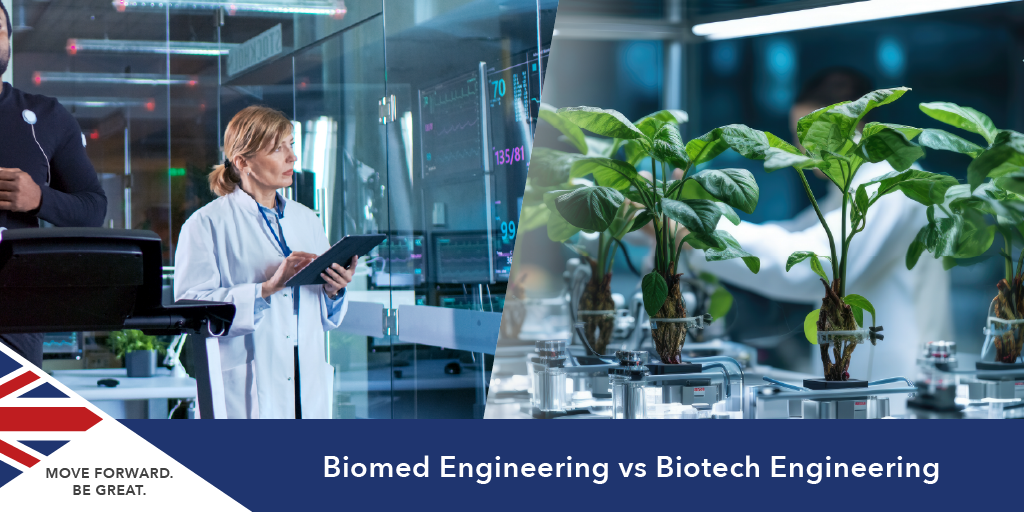Biomedical engineering and biotechnology engineering are diverse fields of study for students who do not want to study a typical medical science degree, and both of these fields of study highlight various untapped aspects of biology.
So, what exactly is biotech engineering? The biotechnology sector includes food, medicine, agriculture, and plants, whilst biomedical engineering utilises engineering applications that are solely for the medical and healthcare fields.
Biotech engineering and biomedical engineering are two different fields that use engineering applications. Learn more below and if you want to apply, contact SI-UK today for a free consultation.
Differences between Biotechnology and Biomedical Engineering
- Biotechnology deals with life science and develops useful products for the agricultural, food and medical industries
- Biomedical engineering deals with human health or the clinical industry
- Biotechnology covers the study of microorganisms such as bacteria but not the medical aspects
- Biomedical engineering students study the science behind cancer and utilize the same in improving research and treatment for disease
- In the field of Biotechnology, a strong grasp of Biology is needed, whereas in Biomedical Engineering, a good hold of Mathematics is required
- Biotechnology covers subjects such as Molecular Biology, Genetic Engineering, Biochemistry, Animal Cell and Tissue Culture, Immunology, Microbiology etc. Biomedical Engineering covers subjects such as Biomedical Instrumentation, Biomaterials, Biomedical Nanotechnology, etc
Eligibility Criteria and Entry Requirements
- Biotechnology Entry Requirements
An applicant requires a score of 80% in their high school, and physics, chemistry, biology, or mathematics are also studied. For the postgraduate level, the applicant must have a bachelor’s degree in subjects such as biochemistry and microbiology.
You must show valid English language scores, your education certificates, transcripts, letters of reference, and other related documents. The minimum requirement for these test scores varies for each university.
- Biomedical Entry Requirements
For biomedical engineering admission, the applicant must have Biology, Physics or Chemistry as their preferred subject at the high school level. For postgraduate programmes, the applicant must hold a bachelor’s degree in subjects such as life sciences.
Apart from this, valid English language scores in any recognized and accepted test are required to show expertise in the language. Documents like a transcript, education certificates and personal statements must be submitted along with the application.
- Biotechnology and Biomedical Course Fees
The average cost of studying for a postgraduate degree in biotech engineering in the UK can be around £23,000. However, it can go higher depending on the university you are applying to. Biomedical engineering at an undergraduate level can cost £13,000 per academic year; for postgraduate degrees, the price can go up to £14,000.
Career Prospects
Biotechnology graduates can work at pharmaceutical companies, agricultural industries, environmental departments and aquaculture forestry. Biomedical engineering graduates work as biomedical or clinical hospital engineers and application specialists in healthcare firms. They can also do research work in the R&D units of healthcare organisations.
If you choose a UK university, you are signing up for skills that make you employer and market-ready. With research-based studies and modules, the students are exposed to the best facilities, and placement opportunities and career guidance at these schools are among the world's best.
Study Biotech Engineering or Biomed Engineering
If you want to study biotech engineering or biomed engineering in the UK, arrange your free consultation with SI-UK in Delhi, Mumbai, Bangalore, Pune, Chennai and Coimbatore today.
FAQ
Biomedical engineering is based on the engineering principles of biology and medicine, along with a distinctly multidisciplinary approach. On the other hand, biotechnology is based on biological science with a focus on chemistry.
No, you cannot become a biomedical engineer with a biotechnology degree. To become a biomedical engineer, you need a degree in biomedical engineering.
No. Maths is an integral part of biomedical engineering.
Biomedical engineering and pharmacy are close disciplines, but they cannot be compared as both focus on the different stages of the health spectrum.
No, biological science and biotechnology are not the same.






 I sincerely thank SI-UK for getting me accepted to UCL. The MSc in Urban Development and Planning is extremely competitive, but the right guidance provided by SI-UK made my dream of studying at University College London a reality. The services were exceptional from beginning to end.
I sincerely thank SI-UK for getting me accepted to UCL. The MSc in Urban Development and Planning is extremely competitive, but the right guidance provided by SI-UK made my dream of studying at University College London a reality. The services were exceptional from beginning to end. 

